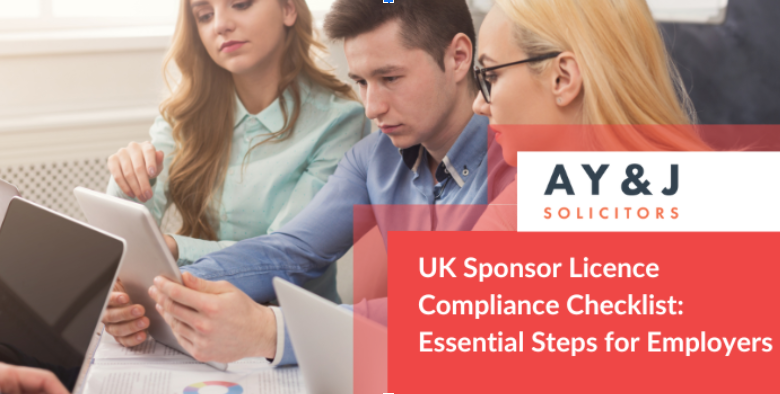UK Sponsor Licence Compliance Checklist: Essential Steps for Employers

For British companies that utilise foreign talent, a skilled worker sponsor licence is an important asset. But with the privilege comes the responsibility of compliance, with the Home Office strictly enforcing sponsor licence compliance rules. Non-compliance can result in suspension or revocation, barring companies from employing foreign staff. To guarantee compliance, employers are required to operate through a formal checklist of all principal obligations. This manual sets out the principal steps organisations must follow in order to keep their sponsor licence on track and sidestep possible penalties.
Carrying out detailed Right-to-Work checks
Having every employee with legal right to work in the UK is a basic sponsor licence compliance requirement. Employers need to check immigration status prior to employment and keep copies of supporting documents. These checks also need to be repeated prior to visa expiry dates to avoid accidental illegal employment.
The Home Office now encourages digital verification, but employers remain responsible for any compliance failures. Regularly reviewing records and scheduling right-to-work audits can prevent oversights that could lead to penalties. Establishing clear internal protocols for right-to-work checks ensures consistency across all hiring teams.
See also: How to Start a Business in the USA as an Indian Entrepreneur?
Keeping accurate and up-to-date records
All the records of sponsored employees need to be kept very carefully. These include copies of passports, visas, biometric residence permits, employment agreements, and salaries. The Home Office can ask for these at any moment, and neglecting to submit them can lead to breaches in compliance.
Employers can establish a secure tracking system to monitor document renewals and deadlines. Internal audit procedures conducted routinely guarantee that any paperwork that must be updated and maintained is accurate, kept up to date, and stored properly. A compliance officer may be used to oversee document management and duly note all updates.
Reporting changes through the Sponsor Management System (SMS)
The Sponsor Management System (SMS) is primarily used to maintain compliance. The employers have to utilise it to notify the Home Office of significant changes, including:
- Company name, structure, or address changes.
- Change in key personnel responsible for the sponsorship work.
- Changes to a sponsored employee’s job title or wages.
- Termination or resignation of a sponsored employee.
Failure to report these alterations within the stipulated timeframe may lead to a breach of compliance, putting the company in jeopardy of having its sponsor licence suspended. Employers should make scheduled checks to ensure that all necessary updates are filed in good time.
Compliance with salary and conditions of employment
Employers should make sure sponsored employees receive a salary at or above the minimum required by the Home Office. Salary changes, promotions, or changes in job requirements should also reflect sponsorship conditions.
Failure in this regard can lead to serious repercussions, such as having a skilled worker sponsor licence withdrawn. Payroll audits on a regular basis can assist employers in remaining compliant with the current salary rules. Employers must also make sure that all job descriptions are in line with the Home Office-approved list of qualifying occupations.
Preparing for Home Office compliance audits
Home Office performs regular and unannounced compliance checks to determine if firms are fulfilling sponsorship commitments. Missing records, errors in right-to-work checks, and failure to record employment changes are some common reasons for the suspension of licences.
Employers need to prepare for such audits by undertaking mock inspections, keeping all documentation current, and educating staff to answer Home Office questions confidently. Having a compliance team in place ensures that the company is ready for an inspection at all times.
Training key personnel on compliance responsibilities
All companies with a skilled worker sponsor licence are required to have designated persons in charge of sponsorship compliance. They are:
- The Authorising Officer is in charge of sponsorship compliance.
- The key contact deals with the home office.
- The Level 1 User verses the SMS system and reporting tasks.
Regular training for these positions ensures they are familiar with evolving compliance requirements. Companies that do not appoint or train key staff members correctly endanger administrative lapses that may result in fines. A properly trained compliance team can substantially minimise the risk of mistakes in sponsorship responsibilities.
Tracking employee attendance and workplace engagement
Sponsored employees are required to work actively. Employers need to track attendance and make sure sponsored workers do not quit or switch jobs significantly without Home Office consent.
If a sponsored employee is off work for an extended period of time without notification, the employer is required to report it using the SMS. Failure to monitor attendance or illegal role-switching might initiate a compliance audit. Employers must maintain a monitoring system to effectively monitor absences and performance.
Avoiding unlawful employment practices
The Home Office pays close attention to illegal work. Employers also need to comply with UK right-to-work conditions for non-sponsored staff. Those companies found using unauthorised workers would be fined extensively and could get their sponsor licence suspended.
Having well-defined policies regarding eligibility to work and conducting frequent checks for compliance by all categories of employees can ensure risk reduction. Managers and HR departments should be trained by the employers on risks involved in illegal employment.
Performing internal compliance reviews
Compliance reviews on a regular basis enable companies to know potential risks beforehand before they develop into serious concerns. Employers ought to have quarterly compliance tests to check papers, audit procedures for right-to-work, and confirm that there are no failures in sponsorship.
Hiring a third-party legal professional to perform an independent compliance audit can further enhance a business’s capacity to be in good standing with the Home Office. Proactive employers can avoid penalties and suspension.
Professional Assistance for Sponsor Licence Compliance
Sponsorship responsibilities can be complicated, and employers find it difficult to comply due to a lack of knowledge. Obtaining professional legal advice will enable companies to cope with changing rules, get ready for audits, and remain in good standing with the Home Office. Compliance specialists can also advise on responding to Home Office inquiries and managing any discrepancies during audits.
Protecting Your Sponsor Licence Status
As UK immigration law continues to change, companies need to place sponsor licence compliance at the top of their agenda to prevent recruitment disruptions from international talent. Employers who adopt formal compliance processes will minimise their risk of sponsor licence suspension and maintain long-term business stability. For professional legal help with sponsor licence compliance, A Y & J Solicitors provides bespoke assistance to ensure that companies comply with Home Office regulations efficiently.
A Y & J Solicitors is a specialist immigration law firm with extensive experience in sponsor licence compliance. We have an in-depth understanding of immigration law and are professional and results-focused. For assistance with your visa application or any other UK immigration law concerns, please contact us at +44 20 7404 7933. We’re here to help!





